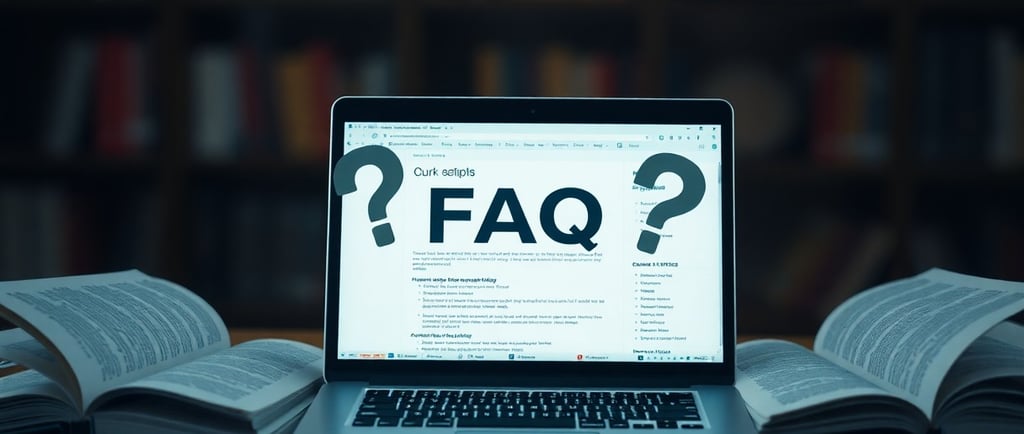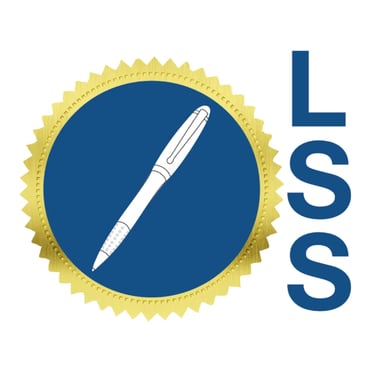5 Frequently Asked Questions (FAQs)
GENERAL NOTARY WORK
Frank L Coxx
2/22/20255 min read


With numerous queries floating around, you may find yourself seeking clarity on common concerns. This blog post aims to address five frequently asked questions that often arise in various contexts. Whether you're looking for insights on a specific topic or general information, your need for reliable answers is about to be fulfilled. Dive in to discover key information that can enhance your understanding and assist you in making informed decisions.
What are FAQs?
The term FAQ stands for "Frequently Asked Questions." These are lists of common inquiries and their corresponding answers, designed to provide clarity and guidance on specific topics. By compiling FAQs, you can anticipate your audience's needs and streamline their learning process, ensuring they find relevant information quickly. You will find FAQs across various platforms, including websites, customer service communications, and product packaging.
Definition and Purpose
Along with enhancing customer experience, FAQs serve to reduce repetitive questions directed at support teams. They function as a self-service resource that empowers you to find solutions without the need for direct interaction. By addressing common concerns, FAQs can enhance understanding and satisfaction, paving the way for improved engagement.
Common Uses in Various Industries
Among the many sectors utilizing FAQs, customer service, e-commerce, healthcare, and education stand out. These industries employ FAQs to address specific concerns, offer product or service information, and provide clarity on processes, which ultimately helps you make informed decisions and saves time.
Hence, you will frequently encounter FAQs when navigating online stores, medical websites, or educational platforms. In e-commerce, they often clarify shipping policies and return procedures, ensuring a smooth shopping experience. In healthcare, FAQs provide information about services, costs, and appointment scheduling, making it easier for patients to access care. Educational institutions utilize FAQs to inform students and parents about admissions, programs, and resources, streamlining the inquiry process. This cross-industry applicability highlights the importance of FAQs as not just a resource, but a vital tool in user engagement and satisfaction.
How to Create Effective FAQs
One of the keys to creating effective FAQs is making them user-focused and easily accessible. Approach your FAQs as a helpful resource for your audience, ensuring that each question is clear and direct. Additionally, consider referencing professional examples or guidelines, such as those found on the Department of Labor's Frequently Asked Questions (FAQs) page, where best practices are demonstrated.
Identifying Common Questions
By examining your audience's concerns and feedback, you can identify common questions that need addressing. Engage with your users through surveys or forums to gain insights into their most pressing queries. This approach will ensure that the FAQs you create provide genuine value and are relevant to your readership.
Structuring the Answers
Before entering into your answers, outline a structure for clarity and ease of understanding. Each response should address the question directly, offering concise and accurate information. This method not only enhances readability but also helps users find quick solutions without wading through unnecessary details.
A well-structured answer should begin with a straightforward response, followed by any necessary elaboration or context that enhances understanding. Use bullet points or ists when appropriate, as this can help break down complex information into digestible parts. Aim for consistency in tone and formatting throughout your FAQs to create a seamless experience for your audience.
Benefits of Using FAQs
Any website or business can greatly benefit from having a well-structured FAQ section. FAQs provide potential customers with quick, straightforward answers to common questions, helping you build trust and transparency. This not only enhances your credibility but also improves user engagement. When customers find what they need easily, they are more likely to make informed decisions and take the desired actions, ultimately boosting your conversion rates.
Enhancing User Experience
By having a dedicated FAQ section, you streamline the user experience on your website. Visitors can quickly locate answers to their queries without sifting through unrelated content. This efficiency leads to a more satisfying browsing experience, encouraging users to spend more time on your site and interact with your offerings.
Reducing Support Inquiries
With an effective FAQ section, you can significantly decrease the number of support inquiries you receive. This allows your support team to focus on more complex issues that require personalized attention, leading to improved service quality and efficiency.
This reduction in support inquiries can also save you valuable resources, allowing your team to dedicate time and energy to enhancing products or services. When commonly asked questions are addressed in the FAQ, your customers feel empowered to find solutions independently. This not only enhances satisfaction but also reinforces your brand's commitment to providing reliable information and customer support.
How Often Should FAQs be Updated?
Now that you’ve established an FAQ section, it’s important to review and update it regularly. Aim to revisit your FAQs at least once every six months or whenever there's a significant change in your products or services. Consistently refreshing your FAQs ensures that your customers have access to the latest information, which can enhance their experience and trust in your brand.
The Importance of Timeliness
About keeping your FAQs current, timely updates help prevent misinformation and clarify your offerings. When you ensure that your FAQ section reflects the latest product features, pricing, or policies, you empower your customers with the knowledge they need, ultimately leading to increased satisfaction and reduced inquiries directed to your support team.
Indicators for Review
Often, you should look for specific signs that indicate it’s time to review your FAQs. Changes in your product offerings, customer feedback, or an increase in repeat queries about a particular topic are all strong indicators that your FAQs might need adjustments to stay relevant.
It’s wise to keep an eye on customer feedback channels and monitor the questions your customers commonly ask over time. If you notice patterns or recurring queries, it may signal that the information in your FAQs is outdated or unclear. Additionally, significant shifts in your industry can necessitate a review to ensure that your FAQs remain helpful and informative. By regularly evaluating these indicators, you can maintain an efficient and user-friendly FAQ section.
FAQs vs. Customer Support
Unlike customer support, which offers personalized assistance for specific issues, FAQs provide quick answers to common inquiries. You might find that FAQs serve as a first line of defense for your customers, addressing their concerns promptly without the need for direct interaction. This can streamline your support process, allowing your team to focus on more complex problems while ensuring your customers still receive the information they need.
When to Use FAQs
To determine when to use FAQs, consider the nature of your product or service and the frequency of common questions. If your customers consistently seek information on specific topics, creating an FAQ section can enhance user experience by delivering immediate responses to their concerns.
Integrating FAQs with Support Channels
Around your support channels, integrating FAQs can create a more seamless experience for your customers. By providing easy access to frequently asked questions through your website, chatbots, or support emails, you can empower users to find solutions on their own while still offering avenues for personalized assistance when needed.
Also, by incorporating FAQs into your support channels, you not only save time for your support team but also enhance customer satisfaction. When customers can quickly locate answers to their questions, they are more likely to feel confident in your service, reducing frustration and improving overall engagement. This integration helps create a cohesive support experience, where FAQs complement personalized assistance, ensuring that you meet your customers’ needs effectively.
To wrap up
Presently, addressing the 5 frequently asked questions can greatly enhance your understanding of any topic. By exploring these common inquiries, you can clarify any uncertainties you might have and gain deeper insights into the subject matter. Engaging with these FAQs empowers you to make informed decisions and enriches your knowledge base. Always feel free to seek out additional resources or ask further questions, ensuring that you stay well-informed and confident in your understanding.st content




